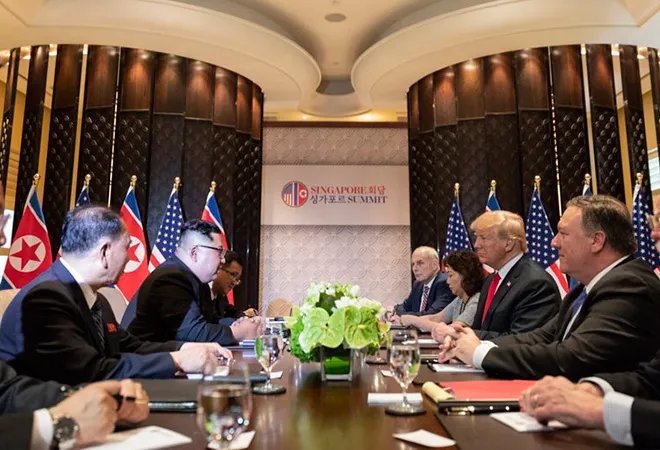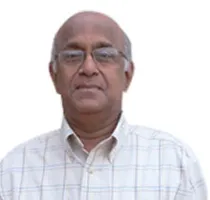-
CENTRES
Progammes & Centres
Location

Image Source: Scavino45
North Korean Supremo Kim meeting President Trump in Singapore
It is hard to recall any recent event in East Asia that drew as much global attention as the summit meeting held between US President Donald Trump and North Korean Chairman Kim Yong Un in Singapore on 12 June 2018. It was undoubtedly a historic event because for the first time since the establishment of the Democratic People’s Republic of Korea (DPRK), the top leaders of the two countries officially met and agreed to usher in a new era of bilateral relations that could contribute to peace and progress on the peninsula.
Given their long history of hostile relations for several decades, there was considerable scepticism whether the two leaders would really meet until the last moment. But when they met finally on 12 June, it naturally created a great deal of euphoria all around.
After the initial euphoria is over, there is now a sober and realistic assessment of what the summit has accomplished and what is likely to follow. Conflicting views on the outcome of the meeting have come from analysts from many countries. There is considerable truth in what one senior Singapore diplomat has written, “What is not stated in the Trump-Kim joint statement is as important as what is stated”. But one would agree with South Korean Foreign Minister Kang Kyun-hwe‘s remark that the joint statement is not the end, but a beginning towards a denuclearised and peaceful Korean peninsula.
The brief joint statement has highlighted the following salient points:
First, both Trump and Kim exchanged in-depth opinions for establishing US-DPRK relations and also for building a robust peace regime on the Korean peninsula.
Second, Trump has committed to provide security guarantee to the DPRK.
Third, Kim has committed to complete denuclearisation of the Korean Peninsula.
There is no doubt that both have undertaken a challenging task almost bordering on a gamble. Both have pledged together to carry out their objective of “a permanent and durable peace-keeping mechanism on the Korean peninsula.” They have to live up to their pledges and any failure to carry out their promises will be fraught with serious difficulties.
But the joint statement makes no reference to “complete, verifiable and irreversible denuclearisation”, a goal Trump has always promised to accomplish. But by simply guaranteeing security to his regime, Kim has been in a way left “scot free”. Prime Minister Shinzo Abe who met Trump twice to reassure himself on his commitment to complete, verifiable and irreversible denuclearisation is quite disappointed at the absence of any reference to it in the final joint statement. In a post summit media conference, when the press confronted Trump on this serious omission, he admitted that there was “no time” to spell it out in the final statement.
"But given the long history of North Korea’s failure to respect its denuclearisation obligations in the past, many critics maintain that a clear time-bound roadmap on denuclearisation as part of the joint statement would have certainly reinforced Kim’s obligations. That the summit statement does not incorporate such a clear action plan is a serious shortcoming."
Another issue that has caused considerable wariness to both South Korea and Japan was Trump’s statement at a post-summit press conference that he would immediately call a halt to the US-ROK joint drills which have been going on for years. This decision reportedly taken without prior consultation with the ROK has dismayed both the South Koreans and the Japanese. The reason given by Trump for his decision that the drills were “provocative and too expensive” was considered as adding insult to the injury by many in South Korea and Japan. But Trump’s decision contradicted the earlier assertions of his administration that these drills, being purely defensive, were essential for ensuring the readiness of the allied forces to face any contingency from North Korea at a short notice.
Japan’s take on the issue was somewhat different. Japan which advocated a policy of maintaining the “maximum pressure” on North Korea from the beginning is quite worried about suspending the joint drills. Many in Japan accuse Trump of being too transactional in his approach, showing little consideration for a long term strategic vision.
Japanese Defence Minister Itsunori Onodera stated that Tokyo’s assessment of the threats posed by North Korea remains the same as before and it will continue to closely watch Pyongyang’s behaviour. Foreign Minister Taro Kono asserted that the decision to halt US-Korean joint drills would have no impact on US-Japan military exercises. Japanese chief cabinet secretary Yoshihide Suga expressed his strong hope that “the US would not change its commitment to the Japan-US alliance and the structure of its military in Japan”.
On 14 June, US Secretary of State Mike Pompeo met both the foreign ministers of Japan and South Korea in Seoul in a bid to reassuring them on American commitment to the complete denuclearisation of North Korea. He assured them further that sanctions would continue until North Korea is denuclearised. On the question of security, he stated that US security guarantees are iron-clad and that suspension of joint drills would not lead to any weakening of the US security system in Eat Asia.
"As for Japan, it will carefully watch the progress of the denuclearization plan in North Korea. At the same time, Abe is also keen to get the long-pending abduction issue finally settled. He is the only East Asian leader who did not meet Kim prior to the Singapore summit."
But both Moon and Trump took up the abduction issue with Kim who shows willingness to meet Abe. There is a hope that Abe will meet Kim at a summit shortly. But that may be useful for salvaging his image at home, but not for solving the abduction issue which has been a bone of contention between the two countries for decades. During the 1970s and 1980s, North Korea abducted many Japanese nationals and used them for its own purposes. It was calculated that there were 17 such clear cases of abductions. Of these, five abductees were brought back to Japan due to the efforts of former Prime Minister Junichiro Koizumi during 2002-05. The fate of the rest of the abductees is still clouded in mystery. Though successive Japanese governments have pursued the matter, the Korean side has always refused to recognise the existence of the issue. Since it is a burning emotive question within Japan, Abe requested both Trump and Moon to take it up with Kim. Kim in his talks with them appeared to be willing to meet Abe to discuss the matter.
But Abe is likely to intensify his efforts to bolster Japan’s defence capabilities. His party has already authorised him to increase the annual defence expenditure beyond one percent of the GNP. He will also stick to his plan of introducing two land-based Aegis Ashore missile defence system in 2023. He will also take new measures to promote Japan’s defence cooperation with several Asian partners.
The views expressed above belong to the author(s). ORF research and analyses now available on Telegram! Click here to access our curated content — blogs, longforms and interviews.

K.V. Kesavan (1938 2021) was Visiting Distinguished Fellow at ORF. He was one of the leading Indian scholars in the field of Japanese studies. Professor ...
Read More +